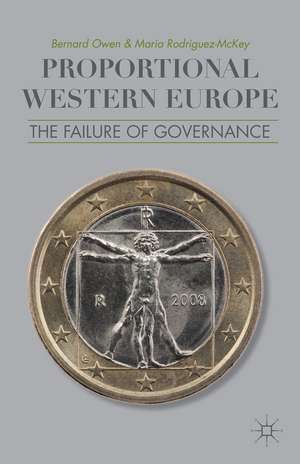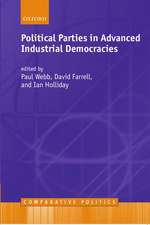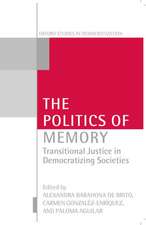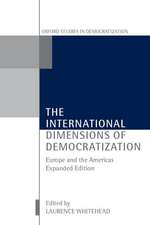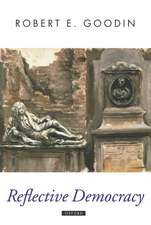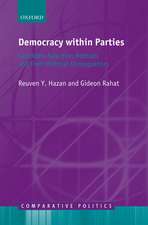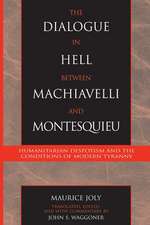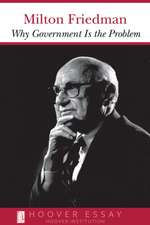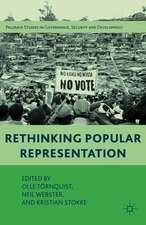Proportional Western Europe: The Failure of Governance
Autor B. Owen, M. Rodriguez-McKeyen Limba Engleză Hardback – 19 noi 2013
| Toate formatele și edițiile | Preț | Express |
|---|---|---|
| Paperback (1) | 383.50 lei 6-8 săpt. | |
| Palgrave Macmillan US – 19 noi 2013 | 383.50 lei 6-8 săpt. | |
| Hardback (1) | 390.63 lei 6-8 săpt. | |
| Palgrave Macmillan US – 19 noi 2013 | 390.63 lei 6-8 săpt. |
Preț: 390.63 lei
Nou
Puncte Express: 586
Preț estimativ în valută:
74.75€ • 77.11$ • 62.38£
74.75€ • 77.11$ • 62.38£
Carte tipărită la comandă
Livrare economică 26 martie-09 aprilie
Preluare comenzi: 021 569.72.76
Specificații
ISBN-13: 9781137353870
ISBN-10: 1137353872
Pagini: 249
Ilustrații: XII, 249 p.
Dimensiuni: 140 x 216 x 23 mm
Greutate: 0.48 kg
Ediția:2013
Editura: Palgrave Macmillan US
Colecția Palgrave Macmillan
Locul publicării:New York, United States
ISBN-10: 1137353872
Pagini: 249
Ilustrații: XII, 249 p.
Dimensiuni: 140 x 216 x 23 mm
Greutate: 0.48 kg
Ediția:2013
Editura: Palgrave Macmillan US
Colecția Palgrave Macmillan
Locul publicării:New York, United States
Cuprins
Introduction PART I: COUNTRIES WITH A DOMINANT PARTY DENMARK, SWEDEN, NORWAY 1. The Party System With The Various Degrees Of Dominance 2. The Voter Influence Structure Or The Search For The Possible Causes Of Dominance 3. A New Welcome Structure For The Protest Vote ITALY 1. Political Institutions. 2. Voters' Influence Structure From 1946 To 1992 3. The Welcome Structure For The Vote Against The Government PART II: A QUASI TWO-PARTY SYSTEM AUSTRIA 1. Political Institutions 2. The Voter Influence Structure 3. Major Change Of The Welcome Structure For The Vote Against The Government PART III: A FRAGMENTED MULTIPARTY SISTEM THE NETHERLANDS 1. Political Institutions 2. The Voter Influence Structure 3. The Welcome Structure For The Vote Against The Government BELGIUM 1. Political Institutions 2. The Voter Influence Structure 3. The Welcome Structure For The Vote Against The Government FINLAND 1. Introduction And Political Institutions 2. The Voter Influence Structure 3. The Welcome Structure Modified FRANCE DURING THE FOURTH REPUBLIC 1. Political Institutions 2. The Voter Influence Structure 3. The Welcome Structure For The Vote Against Government WEIMAR GERMANY (1919-1932) 1. Political Institutions: The Right To Vote, Electoral And Party System 2. The Voter Influence Structure 3. A Welcome Structure Against The Government And Weimar 4. Conclusion
Recenzii
"...explains how proportional rule has led to a lack of political stability in Europe." - Election Administration Reports, January 2014
"Owen & Rodriguez-McKey's new book Proportional Western Europe provides scholars with pregnant new insights into the long-term sustainability and sometimes failure of governance in proportional electoral systems. Their encyclopedic overview of the impact of proportional electoral systems is based on seven small and three large Western European countries. It will become a must for those who want to better understand the successes and shortcomings of contemporary European politics." - Victor Pestoff, Professor, Institute for Civil Society Studies, Ersta Skondal University College, Sweden
"This is an important book and comes at the right time. Electoral systems are a toolkit in the pursuit of political power. Proportional systems can give voice to minorities where recognition contributes to peace and stability. Perhaps this is part of the solution in Ukraine today. Systems of this kind can also give disruptive minorities a balance of power and negative influence in excess of their overall voting strength. Forthcoming elections in Europe may prove the point! Owen and McKey have written a most thorough and detailed book. An excellent and very useful text at this time." - Dr. Thomas W K Scott, Retired, Councillor Democratization, Directorate General for External Relations, Commission of the European Union
'The bookdocuments historic failures of proportional voting systems to ensure that electorates have credible alternatives to outgoing governments at each election. With a ten-country case-study methodology, the authors identify factors which explain stabilities of electoral performance over time. They then focus on specific atypical elections, in which such stabilities are shaken. The most vivid of the studies portrays the 'mushroom' explosion of Denmark's anti-taxation party in 1973; the most spectacular, the collapse of the French Fourth Republic; the most tragic, the rise of the Nazi party in Weimar Germany. These findings - available in France for over a decade - contain the important message that proportional voting systems may have been "oversold" by the international community to countries transitioning to open market systems and democracy.' - John Hartland, ex-Presidential Advisor, Council of Europe Parliamentary Assembly, Post-elections Policy Consultant
"Owen & Rodriguez-McKey's new book Proportional Western Europe provides scholars with pregnant new insights into the long-term sustainability and sometimes failure of governance in proportional electoral systems. Their encyclopedic overview of the impact of proportional electoral systems is based on seven small and three large Western European countries. It will become a must for those who want to better understand the successes and shortcomings of contemporary European politics." - Victor Pestoff, Professor, Institute for Civil Society Studies, Ersta Skondal University College, Sweden
"This is an important book and comes at the right time. Electoral systems are a toolkit in the pursuit of political power. Proportional systems can give voice to minorities where recognition contributes to peace and stability. Perhaps this is part of the solution in Ukraine today. Systems of this kind can also give disruptive minorities a balance of power and negative influence in excess of their overall voting strength. Forthcoming elections in Europe may prove the point! Owen and McKey have written a most thorough and detailed book. An excellent and very useful text at this time." - Dr. Thomas W K Scott, Retired, Councillor Democratization, Directorate General for External Relations, Commission of the European Union
'The bookdocuments historic failures of proportional voting systems to ensure that electorates have credible alternatives to outgoing governments at each election. With a ten-country case-study methodology, the authors identify factors which explain stabilities of electoral performance over time. They then focus on specific atypical elections, in which such stabilities are shaken. The most vivid of the studies portrays the 'mushroom' explosion of Denmark's anti-taxation party in 1973; the most spectacular, the collapse of the French Fourth Republic; the most tragic, the rise of the Nazi party in Weimar Germany. These findings - available in France for over a decade - contain the important message that proportional voting systems may have been "oversold" by the international community to countries transitioning to open market systems and democracy.' - John Hartland, ex-Presidential Advisor, Council of Europe Parliamentary Assembly, Post-elections Policy Consultant
Notă biografică
After a BA from the University of Vermont and a JD from DC School of Law, Maria Rodriguez-McKey obtained a Master's Degree in Russian Law from the Institute of State and Law of the Russian Academy of Sciences. A few years later, she did a post-graduate degree on elections from Pantheon Sorbonne Paris 1 University which lead her to an international practice of election observation and assistance mainly in the Balkan and the Caucuses. She collaborated on Elections in Asia and the Pacific: A Data Handbook (2001), and with Bernard Owen on two of his latest publications: La société civile : un cheval de Troie? and Le Processus Electoral : permanences et évolutions.
Bernard Owen earned a PhD in Political Science from the University Panthéon Sorbonne Paris 1, is now at the head of a post graduate election degree of the same University. He has been involved in electoral matters with international organizations and foreign States. His experience in evolving democracies spreads from far eastern Europe to Africa.
His most recent books are La société civile : un cheval de Troie? (2012), Géopolitique de la démocratie (2008), Le Processus Electoral : permanences et évolutions(2005).
Drs. Owen and Rodriguez-McKey have an electoral column on the website of the main financial daily Les Echos, and also write comments on the University Panthéon Sorbonne Paris 1 newsletter.
Bernard Owen earned a PhD in Political Science from the University Panthéon Sorbonne Paris 1, is now at the head of a post graduate election degree of the same University. He has been involved in electoral matters with international organizations and foreign States. His experience in evolving democracies spreads from far eastern Europe to Africa.
His most recent books are La société civile : un cheval de Troie? (2012), Géopolitique de la démocratie (2008), Le Processus Electoral : permanences et évolutions(2005).
Drs. Owen and Rodriguez-McKey have an electoral column on the website of the main financial daily Les Echos, and also write comments on the University Panthéon Sorbonne Paris 1 newsletter.
